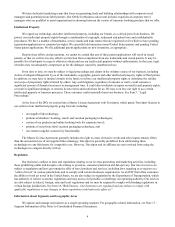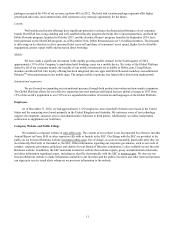Orbitz 2014 Annual Report Download - page 19
Download and view the complete annual report
Please find page 19 of the 2014 Orbitz annual report below. You can navigate through the pages in the report by either clicking on the pages listed below, or by using the keyword search tool below to find specific information within the annual report.19
technologies and systems in the future. Furthermore, our use of this technology could be challenged by claims that we have
infringed upon the patents, copyrights or other intellectual property rights of others. If any of these events occur, our business
could suffer.
System interruptions and the lack of redundancy may cause us to lose customers or business opportunities.
We rely on computer and information technology systems to operate our business and process transactions. If we are
unable to maintain and improve our information technology systems and infrastructure, we may experience extended system
interruptions, which could significantly curtail our ability to conduct business, provide services to our customers and generate
revenue. System interruptions may include slow delivery times, unreliable service levels, prolonged or frequent service
outages, or insufficient capacity in our systems and the systems of critical third parties on which we rely. In addition to the risks
associated with inadequate maintenance or upgrading, our information technologies and systems are vulnerable to damage or
interruption from various causes, including:
• power losses, computer systems failure, Internet and telecommunications or data network failures, operator error,
losses and corruption of data, and similar events;
• computer viruses, penetration by individuals seeking to disrupt operations or misappropriate information and other
physical or electronic breaches of security;
• the failure of third-party systems or services that we rely upon to maintain our own operations; and
• natural disasters, war and acts of terrorism.
Although we have identified and tested redundancy of critical systems and services in an effort to mitigate the above
noted risks, it is possible that our disaster recovery planning may not be sufficient in the face of these threats. In addition, we
may have inadequate insurance coverage to compensate for losses from a major interruption, and remediation may be costly
and have a material adverse effect on our operating results and financial condition. Any extended interruption in our
technologies or systems could have a material adverse effect on our business, financial condition and results of operations.
Our business and financial performance could be negatively impacted by adverse tax events.
New sales, use, occupancy or other tax laws, statutes, rules, regulations or ordinances could be enacted at any time. Such
enactments could adversely affect our domestic and international business operations and our business and financial
performance. Further, existing tax laws, statutes, rules, regulations or ordinances could be interpreted, changed, modified or
applied adversely to us. These events could require us to pay additional tax amounts on a prospective or retroactive basis, as
well as require us to pay fees, penalties and/or interest for past amounts deemed to be due. In addition, our revenue may decline
because we may have to charge more for our services.
New, changed, modified or newly interpreted or applied tax laws could also increase our compliance, operating and other
costs, as well as the costs of our products or services. Further, these events could decrease the capital we have available to
operate our business. Any or all of these events could adversely impact our business and financial performance.
We and other providers of travel in the online travel industry are currently subject to various lawsuits related to hotel
occupancy tax in numerous jurisdictions in the United States, and other jurisdictions may be considering similar lawsuits. An
adverse ruling in the existing hotel occupancy tax cases could require us to pay tax retroactively and prospectively, and possibly
penalties, interest and/or fees. We have also been contacted by several municipalities or other taxing bodies concerning our
possible obligation with respect to local hotel occupancy or related taxes, and certain municipalities have begun audit
proceedings and some have issued assessments against us. If we are found to be subject to the hotel occupancy tax ordinance
by a taxing authority and we appeal the decision in court, certain jurisdictions may attempt to require us to provide financial
security or pay the assessment to the municipality in order to challenge the tax assessment in court. The proliferation of new
hotel occupancy tax cases or audit proceedings could result in substantial additional defense costs. These events could also
adversely impact our business and financial performance.
Our businesses are regulated and any failure to comply with applicable regulations or any changes in those regulations
could adversely affect us.
We operate in a regulated industry both in the United States and internationally. Our business, financial condition and
results of operations could be adversely affected by unfavorable changes in or the enactment of new laws, rules and regulations
applicable to us, which could decrease demand for our products and services, increase costs or subject us to additional
liabilities. Moreover, regulatory authorities have relatively broad discretion to grant, renew and revoke licenses and approvals
and to implement regulations. Accordingly, these regulatory authorities could prevent or temporarily suspend us from carrying
on some or all of our activities or otherwise penalize us if our practices were found not to comply with the then current
























